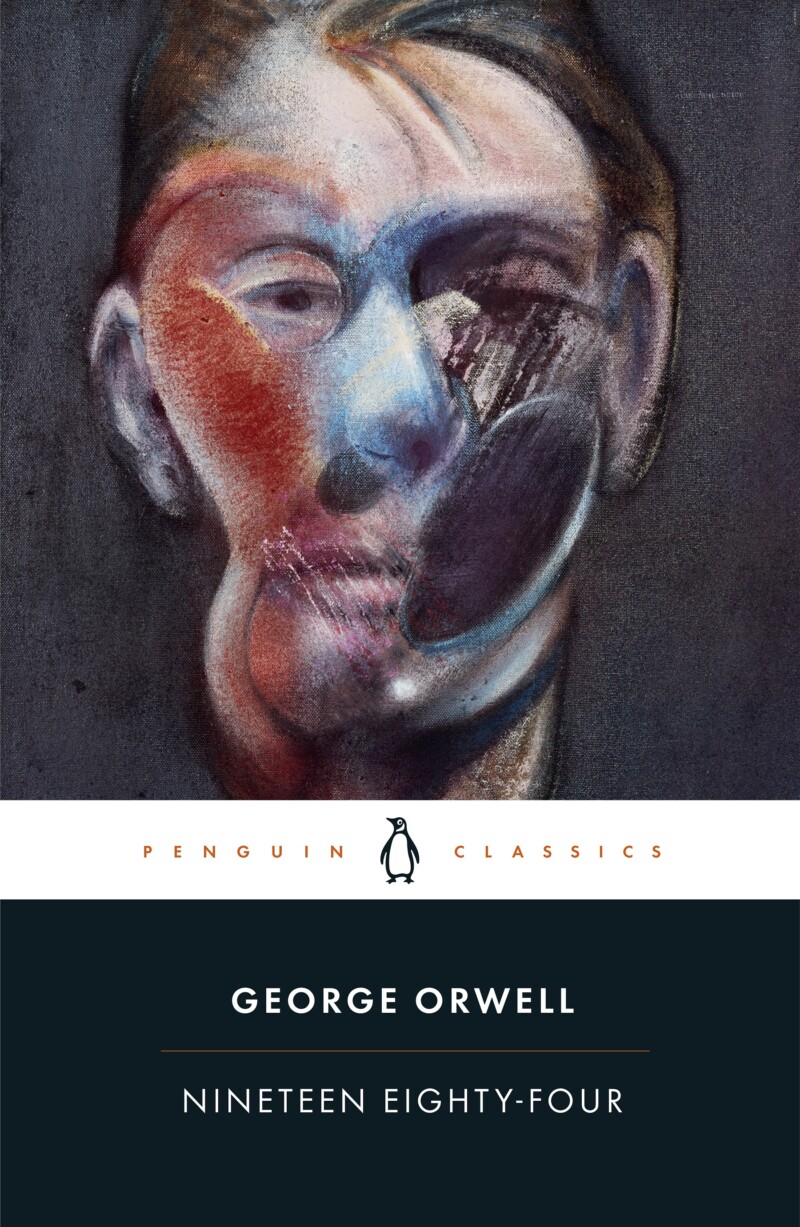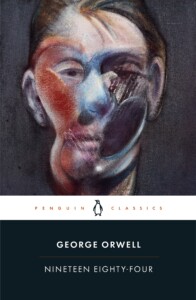Characters in Nineteen Eighty-Four

Share this
2019 marks the 70th anniversary of the first publication of George Orwell’s dystopian novel Nineteen Eighty-Four.
This blog looks at some of the characters in the novel.
Winston Smith
Winston Smith is in his late 30s, but seems older with his varicose veins, false teeth and a hacking cough. His poor health is partly attributable to the meagre diet and periods of acute hunger that he’s known since childhood. He is plagued by ‘the interminable restless monologue that had been running inside his head, literally for years’. He works in the Ministry of Truth where he rewrites archived editions of the Times to reflect the current situation: adjusting a paragraph in a past speech by Big Brother that would show his predictions were accurate; making the original figures for the Ninth Three-Year Plan agree with the newest ones. Although he is troubled by the way in which evidence of the past is systematically destroyed, Winston is good at his work and it is his ‘greatest pleasure in life’.
‘Most of it was tedious routine, but included in it were also jobs so difficult and intricate that you could lose yourself in them as in the depths of a mathematical problem – delicate pieces of forgery in which you had nothing to guide you except your knowledge of the principles of Ingsoc and your estimate of what the Party wanted you to say.’
Winston struggles to recall memories of his own past, but they only appear as ‘a series of bright-lit tableaux’ or as recurrent bad dreams focussed on his mother. Both his parents, along with a baby sister, had ‘been swallowed up in one of the first great purges of the ‘fifties’. Nothing is illegal in Oceania ‘since there were no longer any laws’, but he knows from what little he understands about how the Party operates that he too is fated to be detected and punished, and eventually to disappear. He’s nervous of the police foot-patrols and helicopters and of exposing his unorthodoxy by an uncontrolled facial expression or behaviour. Yet he can’t resist the little acts of rebellion that begin with the purchase of a diary to record his private thoughts and progress to an affair with a younger woman. Through him we experience the feel of ‘gritty dark-brown soap’, ‘a greasy metal tray’ in the ministry canteen and blunt razor blades; the smell of boiled cabbage, dirty clothes and old rag mats; the taste of ‘pinkish-grey stew’ and the oily Victory gin; and the futility of trying to resist the emotions raised by the Two Minutes Hate.
Julia
Julia is in her late 20s and, unlike Winston, has a cheerful, bold and enthusiastic approach to life. Winston takes an instant dislike to her ‘because of the atmosphere of hockey-fields and cold baths and community hikes and general clean-mindedness which she managed to carry about with her’. She changes during their brief affair from a good-humoured seductress who has had scores of lovers and is out for some defiant fun, to a loving companion hoping she can resist any pressure to betray him. She’s confident their love will survive whatever the authorities may do to them and that she can beat the system. Winston reflects:
‘She did not understand that there was no such thing as happiness, that the only victory lay in the far future, long after you were dead, that from the moment of declaring war on the Party it was better to think of yourself as a corpse.’
Julia works in the Fiction Department at the Ministry of Truth, operating and maintaining the novel-writing machines. She enjoys her work as she ‘was fond of using her hands’ but ‘she was not interested in the finished product’. She doesn’t try to analyse the Party or agonise over her missing or contradictory memories: ‘the difference between truth and falsehood did not seem important to her’.
‘She hated the Party, and said so in the crudest words, but she made no general criticism of it. Except where it touched upon her own life she had no interest in Party doctrine . . . Any kind of organised revolt against the Party, which was bound to be a failure, struck her as stupid. The clever thing was to break the rules and stay alive all the same.’
O’Brien
O’Brien is a high-ranking Inner Party official who seduces Winston into defying Big Brother. He is described as ‘a large, burly man with a thick neck and a coarse, humorous, brutal face’. Winston is attracted by ‘the contrast between O’Brien’s urbane manner and his prizefighter’s physique’. He is even more attracted by ‘a secretly-held belief – or perhaps not even a belief, merely a hope – that O’Brien’s political orthodoxy was not perfect’.
The Parsons family
Winston’s neighbours in the shabby apartment block called Victory Mansions include the Parsons family. Mrs Parsons is a ‘colourless, crushed-looking woman’. She is bullied by her children, who Winston sees as being like tiger cubs who ‘will soon grow up into man-eaters’. The boy has a look of ‘calculating ferocity’. Mr Parsons works with Winston at the ministry. He is described as ‘a fattish but active man of paralysing stupidity, a mass of imbecile enthusiasms’. He is a slightly comic figure, in contrast to his frightened wife, ‘invariably [reverting] to shorts when a community hike or any other physical activity gave him an excuse for doing so’. Parsons is particularly proud of his children’s commitment to the Spies. Winston thinks Mr Parsons’ stupidity will keep him safe from the Thought Police – unlike Mrs Parsons – but underestimates the extent to which anyone might be at risk of denouncement, arrest and vaporisation.
The proles
The society of Oceania is divided into three main classes: the Inner Party, an upper-class elite represented by O’Brien; the Outer Party, a middle class of skilled and semi-skilled workers, represented by Winston and his colleagues; and the working-class proles. The proles are considered less than human but relatively harmless by the Party: ‘So long as they continued to work and breed, their other activities were without importance’. They are not Party members and ‘nobody cares what the proles say’.
Winston sees them as the hope for the future, as the Party will never be overthrown from within, and alternatively sentimentalises and despairs of them. They are described as ‘those swarming disregarded masses, 85 per cent of the population of Oceania’. During a wander through the crowded streets in a prole’s district of the city, he is momentarily overjoyed when he thinks he is witnessing the outbreak of a riot against the state, only to realise as he gets closer that it’s a dispute over a saucepan, one of many scarce items hard to obtain. Later he has a frustrating conversation with a prole in his 80s who fails to answer Winston’s questions satisfactorily about what life was really like before the Revolution. ‘The old man’s memory was nothing but a rubbish-heap of details’.


